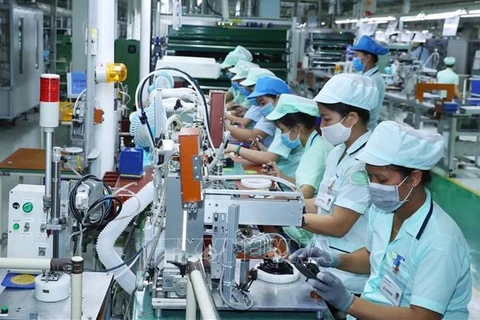 Vietnam aims to become a developing country with modern industry, overcoming the middle income trap by 2025 with an average GDP growth rate of 6.5-7% a year (Photo: VNA)
Vietnam aims to become a developing country with modern industry, overcoming the middle income trap by 2025 with an average GDP growth rate of 6.5-7% a year (Photo: VNA) The statement was made by Dr Can Van Luc, Chief Economist of BIDV and a member of the National Monetary and Financial Policy Advisory Council, at the conference 'Australia – Vietnam Economic Reform (Aus4reform): results, lessons learned and future direction' held in Hanoi on November 15.
Vietnam aims to become a developing country with modern industry, overcoming the middle income trap by 2025 with an average GDP growth rate of 6.5-7% a year.
Luc said to achieve the target, Vietnam should increase labour productivity as its productivity is still low with 4.87% in the 2011-20 period, higher than the average rate of ASEAN (3.11%) but lower than that of China (7%) and India (6%).
Vietnam’s labour productivity growth rate is decreasing, especially after the COVID-19 pandemic, although digital transformation has taken place quite quickly in the past three years. In 2019 it increased by 6.28%; in 2020 by 4.92%; in 2021 an increase of only 4.71% and in 2022 is forecast to increase by about 4%, he added.
According to the International Labour Organisation (ILO), if Vietnam’s labour productivity increases by 1%, its GDP will increase by 0.94 percentage point.
He also said Vietnam should accelerate reform and improve quality, focusing on regulation coordination and enforcement. Many laws and regulations relating to digital economic development, digital finance, e-transactions, circular economy, green economy, and clean energy transition have not been promulgated.
In addition, the economy should enhance independence, self-reliance and resilience as it has large openness and intensive integration as well as a dependence on the FDI sector. On the other hand, priority should be given to green growth and circular economy development associated with increased capacity to adapt to climate change, he said.
With the four economic priorities, it is likely to help Vietnam achieve its goal of rapid, sustainable and inclusive growth, he added.
Sharing the ideas, Dang Duc Anh, deputy head of Central Institute for Economic Management (CIEM) said in order to open up space for new economic activities sustainably, the country should promote innovation and digital transformation; developing labour skills associated with digitalisation, thus helping increase labour productivity.
In addition, sustainable development, emissions reduction associated with applying science and technology, which is not necessarily a trade-off, will be one of the solutions for the development of new economic activities, he added.
Deputy Minister of Planning and Investment Tran Quoc Phuong said that in the process of implementing the policy of restructuring the economy and renewing the growth model, Vietnam had achieved some results, but also encountered many challenges.
Vietnam desperately needs the support of international organisations and donors in the process of economic reform and restructuring, especially in learning from international experiences and good practices, strengthening wide-ranging policy dialogue, enhancing the evidence base in support of policy and institutional reforms, effectively translating into national reform issues, Phuong said.
He added in that context, Vietnam had received timely and practical support from the Australian Government's Department of Foreign Affairs and Trade (DFAT).
The Aus4Reform Programme, funded by the Australian Government, aims to support Vietnamese agencies in implementing the plan to restructure the economy, renovate the growth model, and improve the business and investment environment towards improving labour productivity, quality and competitiveness of the economy for rapid and sustainable development. The programme was implemented from November 2017 to November 2022 with a grant of 6.5 million Australian dollars (4.38 million USD).
Aus4Reform is the third iteration of Australia’s decade-long support for Vietnam’s economic reform, including the Beyond WTO Programme (2008-14), the Restructuring for a more Competitive Vietnam Project (2014-17) and the Australia-Vietnam Economic Reform Programme (Aus4Reform) (2017-22).
The implementation of the Aus4Reform Program with appropriate goals and content, and diverse participants has brought practical results to Vietnam.
The results of the Aus4Reform Programme are used as a basis for implementing reforms aimed at improving the business and investment environment, enhancing market economy institutions, developing the private sector, and strengthening competition and consumer protection institutions, accelerating the restructure of the rural economy; thereby contributing to improving labour productivity and competitiveness of the economy, the deputy minister said.
Along with the process of economic reform and transformation of the country's growth model, the need for technical assistance in this field will be enormous in the coming years. The outcomes achieved from this programme will serve as the basis for building the next of Australia's support programmes for economic reform in Vietnam./.
VNA























